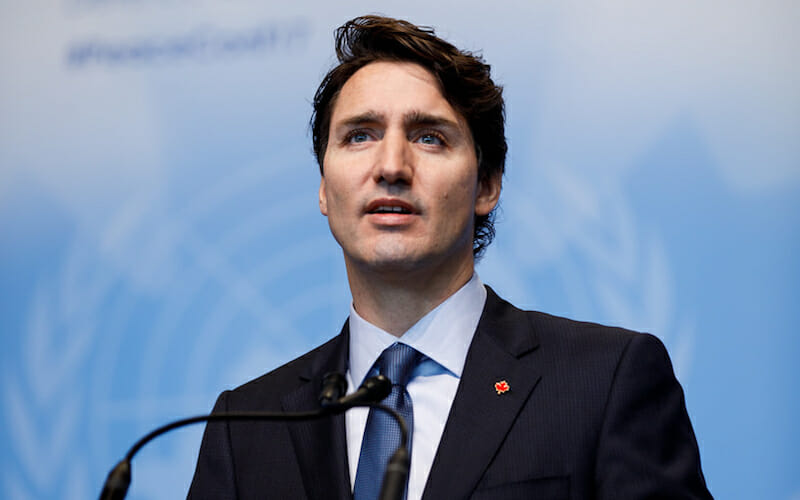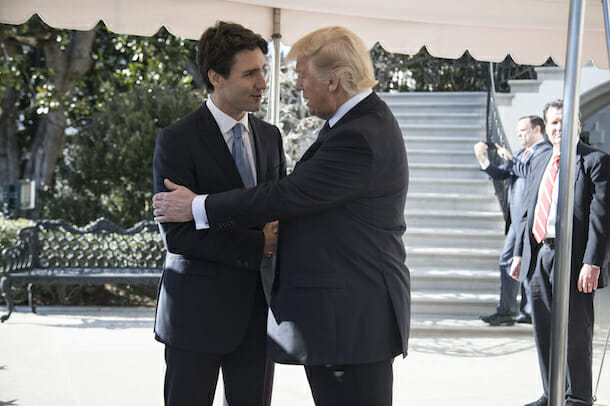
Trump’s National Security Strategy: What Does it Mean for Canada?
It’s interesting to note that of the last three American presidential administrations, Donald Trump’s is the only one to publish a National Security Strategy (NSS) on time. But that strategy poses serious foreign policy issues for Canada – issues that Justin Trudeau and Canadian businesses should be keenly aware of.
As former US NATO Ambassador Nicholas Burns mentioned in a tweet when the document came out, “…his policy of [the] last 12 months [is] a radical departure from every President since WWII. Trump [is] weak on NATO, Russia, trade, climate, diplomacy…” In short, the NSS only adds to the image of Trump’s weakened foreign policy. Emphasizing its dangers, former National Security Adviser Susan Rice said the document is an “almost dystopian portrait of an ‘extraordinarily dangerous’ world characterized by hostile states and lurking threats…there is no common good, no international community, no universal values, only American values.”
A close look at the NSS’ section on “American Prosperity” lays bare its dystopian and protectionist rhetoric. Not only will the strategy challenge Canada’s approach to NAFTA renegotiations, but it also has the potential to cause unnecessary economic instability for other allied countries and prevent supply chains actively seeking to promote sustainable practices from flourishing.
These issues stem from the priority action focusing on “Counter[ing] unfair trade practices,” which states the US will “counter all unfair trade practices that distort markets using all appropriate means, from dialogue to enforcement tools.” It’s clearly a broad statement, but what exactly do the means of dialogue and enforcement tools mean?
One only needs to consider some of the administration’s moves in relation to America’s economic and national security throughout 2017, from the Bombardier affair to the looming possibility of tariffs on steel and aluminum imports. The latter is an especially telling example that should be on the radar of Canadian policymakers – especially for those involved in NAFTA renegotiations.
Why? Other than the fact that Canada exports $4 billion worth of the grey metal to the US every year, Trump’s approach to aluminum demonstrates his administration’s default setting isn’t “dialogue” but instead the liberal use of “enforcement tools” against friend and foe alike.

The issue of aluminum and steel imports to the United States largely has to do with Trump’s suspicions of Chinese dumping in the industry. The past decade has seen China become the world’s largest producer of steel and aluminum, partly due to generous government subsidies and outsized reliance on cheap (but dirty) coal power that allows them to sell at the cheapest price. This has created massive overcapacity in the steel and aluminum sectors, depressing prices and almost bankrupting the American metals industry.
But if Chinese dumping is contributing to the destruction of the US market, anti-dumping policies should be specifically targeted at the source. Instead, the US government’s investigation into Beijing’s trade practices could result in general tariffs on steel and aluminum imports that are applied indiscriminately across the board. That would be counter-productive in stopping Chinese overproduction and damage Canada’s economy in the process.
Here’s why: despite Trump’s argument that the US economy must be protected from global competition, the global economic system is not a zero-sum game. It has created mutually beneficial supply chains between countries across the globe, supply chains Trump’s tariff plans threaten to undermine.
Next, China is no longer a major exporter of aluminum to the United States. In 2015, it only accounted for 5% of exports to the US. At the same time, a punitive tariff regime applied to this small percentage of imports will result in unintended costs and disproportionally affect other countries with a much larger share of metal imports to the US, including Canada but also the UK. As it stands, Canada provides over half of Washington’s aluminum imports, making it by far the largest exporter. Were tariffs to pass, Canada could lose its largest export market for aluminum. That could in turn contribute to an oversupply of the metal on Canada’s domestic market, hitting the fortunes of companies such as Rio Tinto.
And the problem is not merely limited to Rio Tinto. Other aluminum producers like Alcoa and Rusal will be affected too. Rusal, for example, is a primary supplier of low-carbon aluminum to multiple American industries. Tariffs would diminish America’s access to such “green aluminum” at a time when environmental concerns are increasingly factored into business decisions to stay competitive. Without domestic sources for low-carbon metals, US industries won’t be able to respond to the rising market demand for environmentally-friendly products, hurting US and Canadian firms and both countries’ economies.
Britain faces a similar challenge, made more urgent by Brexit negotiations. Seven per cent of all UK steel exports head for the US. Under a general tariff, the country’s steel industry would see annual losses worth £300 million. Other European NATO members have stepped up their lobbying efforts to convince the White House their steel and aluminum exports do not, in fact, threaten US national security.
If Washington’s European partners are wary of the Trump administration’s ruminations, Canadian officials are all the more puzzled. Canada and the US are bound by a strong relationship predicated on trade, defense sharing and cooperation. Aluminum and steel production constitute two vital pillars of a shared industrial base.
Considering the example of the investigations into steel and aluminum imports, Canada should be paying very careful attention to the implications of Trump’s new NSS. As an immediate response, Justin Trudeau and his advisors should determine how to maintain and possibly enhance the Chapter 19 provisions of the NAFTA agreement to protect Canadian companies and consumers from negative repercussions. Anything less would mean Ottawa ignoring a real threat to Canada’s own interests.

